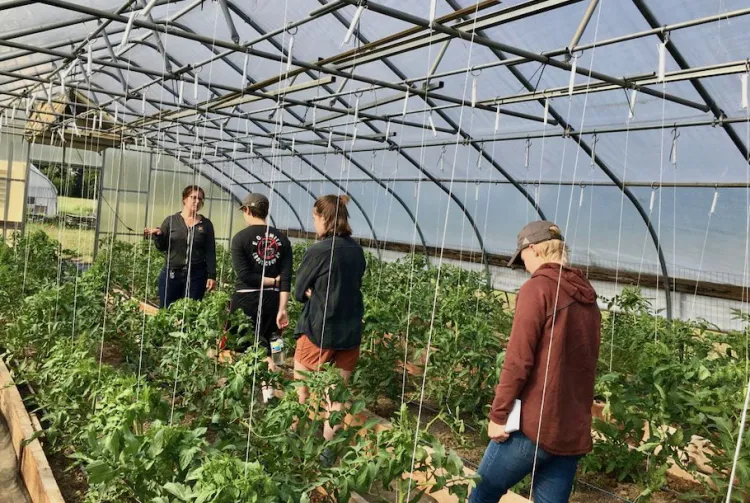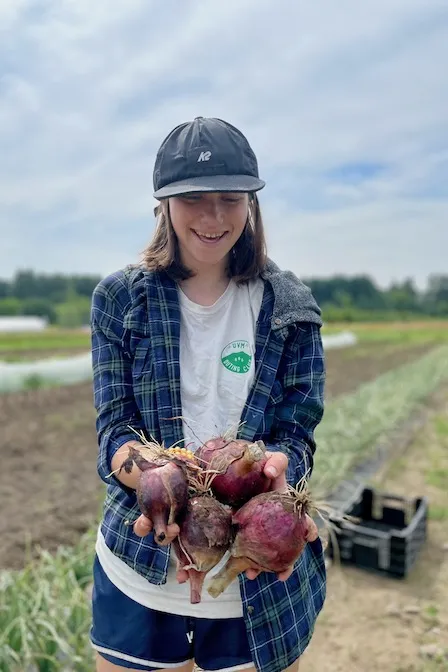There’s no place Charlotte Smith would have rather spent her summer than on farms in Vermont scouting for bugs. An environmental studies major, Smith is part of an inaugural cohort of students in the Agroecology Extension (AX) Summer Research Fellowship, a 10-week program that combines research, outreach, leadership development and reflection on issues facing farmers and sustainable food production.
“It’s an incredibly high-impact program,” explained Scott Lewins, the extension director for the fellowship. “You can take a class online or in-person, but I hear repeatedly from students and academics that what students really crave are these experiential learning opportunities.”
One of the fellowship's defining features is an intentional focus on equipping students with the skills to conduct impactful research in partnership with the communities they aim to serve. A collaboration between UVM Extension, the Plant and Soil Science Department and Agroecology Livelihoods and Collaborative at UVM, the program pairs undergraduate students with mentors engaged in various agroecological research projects and gives them experience as extension outreach professionals translating the research for growers and the public.
“My favorite thing has definitely been connecting with farmers all over Vermont,” said Ashley Pearson, AX Fellow and agroecology major. “At first, I thought I would be working mainly with UVM faculty, but to connect with people throughout the state has been really rewarding.”
Read on to learn more about a few of the projects and ways students are making an impact in the Vermont food system and beyond.
Building an Agroecology Network

As indicated in its name, the AX Fellowship is grounded in agroecology – a science, practice and growing movement around sustainable food production. Agroecology is a more holistic way of approaching agriculture that considers not only crop production and yield, but the sustainability of the ecosystem itself, explained Vic Izzo, AX Fellowship Academic Director. Since most research in the agroecology field has focused on rural settings, a team of UVM researchers is working to understand how agroecological principles are – or are not – present in urban environments.
AX Fellow and community and international development major Avi Bauer is working with UVM researchers Martha Caswell and Nell Carpenter to help foster learning exchanges with farmers in the urban and peri-urban fringe of Burlington. Using a participatory research approach, their goal is to identify opportunities and barriers to integrating agroecological practices in farming practices. A key aspect of the work involves strengthening the network of the local farming community. “If one of the farmers in any part of the network needs help with something or someone to bounce ideas off of, having social capital is really key. The more people we can connect through these kinds of participatory processes, the better,” said Bauer.
Scouting for Pests
“That’s the leek moth right there. They’re really flying,” said Pearson to Smith on a sunny August afternoon at UVM’s Catamount Farm. The two students served as extension agents this summer scouting for insects on farms around Burlington. Each week, they would inspect crops and check pest monitoring traps for different pests and compile their findings in a report distributed to over 1000 growers in the Northeast through the Vermont Vegetable and Berry Growers Association.
The report helps growers know what they might expect in their fields and provides resources for managing those pests. “I didn’t expect to be doing something that would be helping the community so directly. We’ve received a lot of good feedback from farmers,” said Pearson.
Preserving Soil Diversity

For Sophia Wilcox-Warren, the AX fellowship offered a window into a future as an academic researcher or educator. A food systems and environmental studies senior, Wilcox-Warren worked with PhD student Eva Kinnebrew to evaluate the impact of plastic tarps – often placed over crop beds to decompose cover crops and weeds – on beneficial insects like beetles, ants and millipedes who make their home in the soil below. Wilcox-Warren is continuing the research as an ALC Undergraduate Research Fellow this fall gathering more ecological data and interviewing farmers about their perceptions of tarping practices.
“I’ve never done research like this before so I’m learning a lot about how to actually do an experiment and all the different tasks involved,” said Wilcox-Warren. “I’ve also learned a lot about the PhD side of things, which I’ve never known.”
The fellowship will continue for the next four years as part of USDA NIFA's Research and Extension Experience for Undergraduates (REEU) program. The workforce development grant will bring students both from UVM and institutions across the country to Vermont for an immersive summer research and extension experience in agroecology.